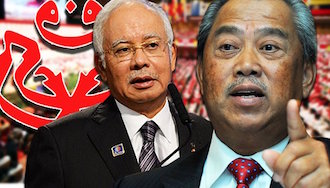A crucial year ahead
Lim Sue Goan, Sin Chew Daily
2016 is going to be a very crucial year, especially for the country’s political and economic development. The year will determine whether we are heading towards greater prosperity or are spiraling downward.
The start of 2016 also marks the fact that we re only four years away from our original vision of a high-income developed country status, and two years from the next general elections. Our political leaders are obliged to make a decisive move next year, and if their attitude and mentality remain unchanged, the situation will only get worse.
The Malay political reshuffle has yet to come to close in 2015, and as such will carry on into 2016.
Najib appears to be firmly in control of Umno, and therefore he has no need of sacking of freezing the membership of his ex-deputy Muhyiddin Yassin.
That said, an undercurrent has already been built up, and if Mahathir and Muhyiddin intensify their firepower next year, it is likely that Najib will do something to prevent the rift from further widening.
Umno is heading for a split if Muhyiddin et al are fired. Will the frustrated members quit the party en masse and hop over to the opposition? And will this rock Umno’s support base in the rural areas?
With Umno now exchanging glances with PAS, even if Muhyiddin’s supporters were to quit Umno, they are highly unlikely to join PAS either. Moreover, it is possible that PAS itself is seeing another round of split.
While PAS president Hadi Awang has not rejected outright Najib’s olive branch, his attitude towards a tie-up with Umno remains highly ambiguous. As a matter of fact, Hadi already showed his inclination to work with Umno even when Nik Aziz was still around.
If he how takes a resolved stance to with alongside Umno, it is inevitable that the party will see further split.
What kind of impact will the split within Umno and PAS have on the Malay community? The two weakened Malay parties are bound to head towards the more conservative way. Religious and ethnic issues will further polarise our existing society.
It remains yet to be seen whether the newly established opposition pact Pakatan Harapan could turn things around or itself be sucked into the extreme political swift currents.
The imprisonment of Anwar Ibrahim and a shift in Hadi’s direction have caused the opposition camp to lose a convincing Malay leader.
While Amanah could win over some voters unhappy with Umno and PAS, it simply lacks the grassroots power that could rock the boat of these two parties in rural constituencies. Amanah needs more rural members from PAS to complete its organization and network.
Pakatan Harapan will hold its first leadership summit to discuss common policies guidelines on January 9, and this will include the form of cooperation with PAS and the stand on hudud issue.
Unfortunately the opposition has displayed too much opportunism of late. PKR’s indecisive relationship with PAS and its indolence in dedicating itself to rural political struggles, hoping that voters unhappy with BN will automatically support them.
Coming to economy, how the treasury is going to revise the 2016 Budget and whether the private sector can weather the economic predicament will determine the country’s economic prospects.
Owing to plunging international crude prices, the national coffers’ revenue is expected to be trimmed by billions, and the fiscal deficits are likely to climb to 3.5 per cent of GDP in 2016 from 3.1 per cent this year. And as such, it is essential for the government to further cut the expenses.
Goods prices are already at staggering levels now and it is widely anticipated that inflation will pick up steam next year. Further cuts in subsidies and social benefits or additional taxes will only add to the burden of the rakyat.
The government must consider cutting operating expenses, especially with the civil servants’ salaries running up to RM70 billion next year.
Simply transferring the government’s financial burden to the public is contrary to the government’s pledge of putting people first. If the administrative team is not streamlined, it will sooner or later gobble up the country’s precious resources.
The government’s economic transformation programme has only managed to diversify the economy but has failed to wane the economy from reliance upon foreign workforce. An economy that lacks a powerful source of revenue and creativity will never be able to deal with the tremendous challenges, and may in the end resort to the disposition of its own assets.
Companies with significant political backgrounds have grown accustomed to government protection. But, will the government continue to shield them in the event of an economic recession?


